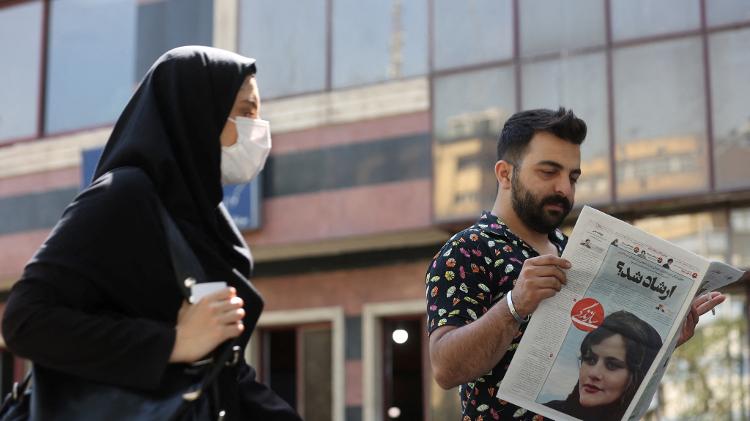Protests erupted in western Iran and on Iranian social media over the death of a woman detained by the morality police for using a gun. hijab, traditional islamic veil.
Mahsa Amini, 22, born in Kurdistan in northwest Iran, was visiting the capital with her family when she was arrested Tuesday by police, which enforced strict dress codes for women.
The police unit tasked with enforcing the mandatory Muslim hijab in the country has been criticized several times in recent months for its violent interventions against women suspected of violating the country’s dress code since the Islamic revolution in 1979.
Activists accuse police of beating; The government claims the victim had a heart attack. Authorities launched an investigation into Mahsa Amini’s death at the request of President Ebrahim Raisi, state media reported on Friday.
Police claimed that the 22-year-old fell ill while waiting at a morality station with other women detained.
“According to detailed investigations, there has been no physical encounter with him since his transfer to the vehicle, as well as at his location (at the station),” said a police statement denying allegations that Amini was possibly beaten.
Closed-circuit television (CCTV) footage carried by the state broadcaster shows a woman identified as Amini falling down after getting up from her seat to speak to an official at a police station.
Police previously denied that Amini had a heart attack after being taken to the police station to be “convincing and polite”, and denied allegations that she had been beaten, according to the state broadcaster.
His relatives denied that he had a heart condition.
A photo released by Iranian activists shows a woman. mahsa Amini was intubated in the hospital.
Protesters took to the streets and women took off their veils in public. On Friday afternoon, a crowd gathered in front of Kasra Hospital in central Tehran, where the woman died after being in a coma for three days.
(17) During Mahsa Amini’s funeral on Saturday, videos posted on social media showed protesters chanting anti-government slogans after they had gathered in the victim’s hometown of Saqez.
Some protesters shouted “Death to the dictator”, referring to Supreme Leader Ayatollah Ali Khamenei, after police sprayed pepper spray.
During the protests, some women also took off their headscarves together, according to publications by Iranian journalists and activists.
In recent months, activists have called for women to remove their veils in public; this is a gesture that could put them in jail for not following the Islamic dress code as the country cracks down on “immoral behaviour”.
Protesters then took to the provincial capital, Sanandaj, on Saturday, with videos showing crowds on social media chanting “Saqez is not alone, he is supported by Sanandaj”. The marchers were seen occasionally clashing with the police amid gunfire.
Iranian personalities and newspapers deny death. The headlines of “Dear Mahsa, your name will be a symbol” appeared on the headlines of the business newspaper. Asia this Sunday (18), along with most of the Iranian press.
The reformist newspaper said, “The people are angry and angry at what happened to Mahsa Amini.” Etemadnoting that the nation has seen “repeated violence by the moral police”. moderated newspaper Jomhouri Islamic warned of “social rupture” caused by the “violent behavior” of police officers.
The Iranian government daily accused the reformers of “exploiting the feelings of the people by using an unfortunate event to turn the nation against the government and the president”.
Persian hashtag on Twitter #Mahsa_Amini first place this sundaywith about 1.5 million tweets.
Many filmmakers, artists, sports figures, politicians and religious figures expressed their anger on social media.
Former president and reformist leader Mohammad Khatami urged authorities to “end the acts contrary to law, logic and sharia” and “bring the perpetrators of the incident to justice”.
Grand Ayatollah Esadollah Bayat Zanjani described all “behaviors and events” that led to “this unfortunate and sad event” as “illegal” and “illegal”.
“The Quran clearly prevents believers from imposing what they see as religious and moral values,” he said.
“Mahsa is more alive than we are today,” said film director Asghar Farhadi on Instagram, who won two Oscars for best foreign film, because “we are sleeping, we are complicit in this crime without reacting to this endless cruelty”.
“Our girls’ hair is covered with a shroud,” wrote several players on the national football team.
*With information from AFP and Reuters
source: Noticias
